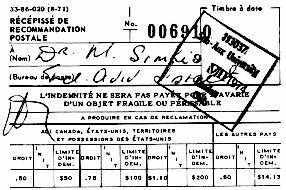
|
Department of Psychology University of Western Ontario London, Ontario Canada N6A 3K7 July 10, 1974 |
Dr. M. Simhi
Head of Radar and ECM
Ministry of Defence
Tel-Aviv, Israel
Dear Dr. Simhi:
Thank you for your letter of December 24, 1973 (reference number ML-1228).
I would like to pass along for your consideration a variation of the balloon-decoy idea. It is that instead of using balloons, it might be possible to use foam. The ideas are similar in that in both cases, a low-volume, low-mass package rapidly expands to produce a large but low-density decoy; the chief difference being that a balloon is a single space enclosed by a solid whereas foam is many spaces each enclosed by a liquid.
Optimally, the foam would have heat and radar characteristics that would attract a missile, but foam might have an additional advantage which I think of as "spitting in the missile's eye." That is, the foam could be chosen so that if penetrated by a missile (or by a pursuing airplane), it would cover the missile with a film that was opaque to heat and radar, thereby blinding the missile. A secondary advantage might be that unlike the balloon, foam can disappear in a few minutes leaving nothing for the enemy to retrieve and examine.
I am enclosing a photocopy of an advertisement for foams that appeared in the September, 1973 issue of Scientific American, from which it appears that a wide variety of foams has already been developed.
|
Sincerely yours, Lubomir S. Prytulak, PhD Assistant Professor |
